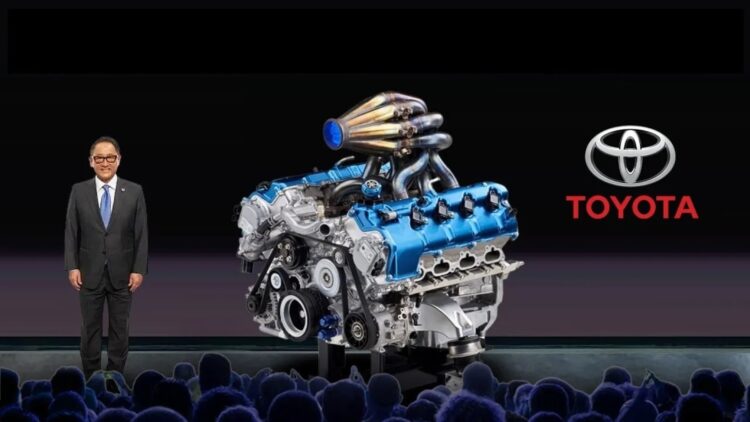©2021 Reporters Post24. All Rights Reserved.
In a surprise revelation, Toyota has sent shockwaves throughout the automotive world with an all-new engine that melds combustion technology with the potential for zero emissions. This stealth development may transform our thinking about green energy and the future of transportation. For two decades, the world has been struggling over what the road to sustainable transport would look like, and to date, EVs have proven a front-runner. However, Toyota’s latest development puts a monkey wrench into that thinking by suggesting that a hydrogen-powered combustion engine may be what carries us into the future.
How Toyota’s hydrogen combustion engine outperforms electric vehicles in speed, power, and sustainability
While Toyota is no stranger to innovation—it gave the world its first mass-produced hybrid, the Prius, back in 1997—it has traditionally taken a more cautious approach toward anything resembling an electric vehicle. Less conservatively speaking, the hydrogen-powered combustion engine signifies a quantum leap. This latest motor technology is based on a variant of the same 1.6-liter turbocharged three-cylinder used in its GR Corolla and GR Yaris. Instead, it relies on hydrogen, not traditional gasoline, to run the engine, making it cleaner than conventional combustion engines.
This innovative engine could also hold the key to one of the most significant challenges for the car-making industry: balancing high performance with sustainability. While electric cars take away that visceral experience from driving enthusiasts, Toyota’s hydrogen engine ensures a gasoline-powered car’s rumble, response, and mechanical integrity. The company tested it thoroughly through the grueling conditions of motorsports, including endurance events such as the Fuji 24 Hours.
Why Toyota believes hydrogen power solves key EV issues: faster charging, stable in any climate
Toyota is unwilling to dive headfirst into the all-electric trend immediately because it believes EVs are not the solution to the world’s energy crisis. The biggest plus for the hydrogen engine has to be refueling speed. It takes but a fraction of the time to refuel a hydrogen car as it does to charge an electric vehicle. Refueling the hydrogen version of the Toyota Yaris GRH2 takes, for instance, 90 seconds compared to the time to charge the battery fully in the electric version.
Hydrogen is also highly adaptable to extreme climates. While lithium-ion batteries in EVs can sometimes freeze in subzero temperatures, hydrogen can resist freezing down to -435°F, making it workable for various environmental conditions. The wide adaptability could give hydrogen engines an advantage in regions where temperature extremities make EVs less reliable.
Material scarcity is another critical factor: with the manufacture of EVs ramping up, the long-term availability of such materials, including lithium and battery-grade nickel, has become more precarious. Hydrogen combustion engines sidestep this problem. Whereas large batteries in electric cars are made from rare materials, hydrogen engines run on abundant elements that could prevent the resource shortages many predict for EVs.
Toyota’s strategy for overcoming the hydrogen engine’s durability and infrastructure limitations
Yet, with the advantages of hydrogen combustion, this process has setbacks. One of the main challenges in using this fuel has always been deliriously high temperatures inside the combustion chamber, which could perpetuate the underperformance rate and, by association, durability problems with the Toyota engine. Water-cooled hydrogen technology has, however, made a breakthrough for Toyota engine quite recently. This system injects water into the combustion chamber to dissipate heat and create a more stable performance, increasing the engine’s life.
Besides, the infrastructures for hydrogen refueling stations are still in their infancy compared to the general proliferation of electric charging stations. Along with other members of the Hydrogen Council, Toyota has pledged billions of dollars toward increasing hydrogen infrastructure and making this technology commercially relevant. This long-term investment shows that Toyota is betting on hydrogen as a serious contender in the green energy race.
Hydrogen power is the foundation for Toyota’s future engine green vehicles in a changing world
More importantly, Toyota made this announcement at a time when most car manufacturers have focused most of their efforts in recent times on BEVs. With only a tiny fraction of the total global car market presently represented by EVs, there is room for alternative solutions, such as hydrogen combustion. This commitment to hydrogen on the part of Toyota also extends to deciding to concentrate much of its production for this new technology in China and Europe, where the hydrogen infrastructure is growing more rapidly than in North America.
Hydrogen-powered cars have already hit the road, in growing demand, especially in regions like California and Europe, starting with the Japanese carmaker Toyota with the Mirai car model. While sales are still in their infancy, the Japanese giant expects to sell more than 200,000 hydrogen vehicles by 2030. It might sound ambitious, but if governments and industries push for carbon neutrality, hydrogen will be the next big thing in sustainable transport.


